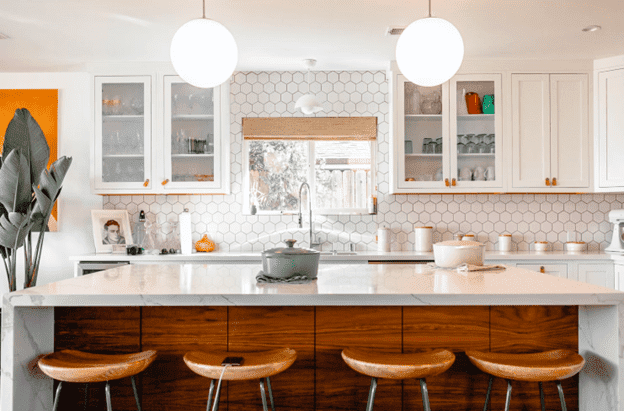When it comes to kitchen renovations, the countertop is one of the most important features to consider. It’s the workspace of your kitchen and also one of its most prominent visual elements, so you’ll want a surface that’s both functional and beautiful. There are a variety of materials to choose from, but not all of them are created equal. Here are the pros and cons of some classic countertop favorites and a few more unusual counter materials for you to consider when preparing for your kitchen remodel.
Granite Countertops
There’s a reason granite countertops are a staple on so many homebuyers’ wishlists. This classic countertop material is renowned for its durability and beauty. Granite is a natural stone, so each piece has unique veining and coloration that can range from light to dark and subtle to bold.
Granite is also highly heat-resistant. You can place hot pots and pans directly on the counter without fear of damaging the surface.
One downside of granite is that it requires regular sealing and maintenance to keep it looking its best. Granite is a porous material that can stain if it’s not properly sealed or if spills are left to sit.
Pros: Every slab of granite is one of a kind, giving it a special beauty. It resists heat, cuts, and scratches.
Cons: Needs to be sealed to prevent stains and can be quite expensive, so they may not be the best option if you’re looking to renovate your kitchen on a tighter budget. Chips generally need professional repair.
Quartz Countertops
Quartz counters are popular for their durability and sleek appearance. Much more resistant to scratches and stains than marble, another popular material for white countertops, quartz is also non-porous, so it won’t absorb spills and bacteria the way wood or laminate surfaces can. Quartz comes in a wide range of colors and patterns, so you’re sure to find an option that fits your kitchen’s style.
Quartz is also one of the easiest counter materials to care for. Simply wipe down the surface with a mild soap and water solution to keep it clean. It’s also on the affordable end of the scale when it comes to high-quality counters, often beating out granite.
Pros: Durable, low-maintenance, resists scratches and stains, non-porous, has a wide range of appearances that can fit many kitchen styles
Cons: Quartz countertops can be more expensive than other options, such as laminate or tile. If they chip, they typically need professional repair.
Soapstone Countertops
Soapstone countertops are a less common countertop option, but they’re definitely worth considering. Soapstone is a dense natural stone that comes in dark colors and lends a natural-feeling touch to any space. It’s also non-porous and thus stain-resistant, unlike other natural stone countertops.
Soapstone is a very beautiful natural material, but it’s fairly soft as far as stone countertops go. This means it can scratch more easily than harder stones like granite. However, thanks to its non-porous qualities and not needing to be sealed, it’s possible to sand out scratches or small dents without ruining the look.
Pros: As a stone material, soapstone counters are heat resistant, but unlike other natural stones, it doesn’t need to be sealed. This makes them low-maintenance.
Cons: As a natural stone, it can be expensive. It can also be vulnerable to scratches and has limited color options. If you’re looking to paint your cabinets to customize your kitchen, the natural dark colors of the counters can be limiting to your color palette.
Butcher Block Countertops
Butcher block countertops are a great option if you’re looking for a sturdy, natural material that can double as a cutting board. Butcher block counters are beautiful and unique, with each wood piece adding its grain and character to the surface. Butcher block is also very affordable compared to other high-end countertop options.
Because it’s wood rather than stone or stone-like material that requires a wet saw, butcher block is also easier for those performing a DIY home renovation to work with.
Pros: An affordable, natural material that develops character over time and can be used as a cutting board if you like. Since it’s wood, scratches and the like can be sanded out as long as you’re careful to quickly reapply a sealant.
Cons: Unlike stone, butcher block counters can be damaged by water and heat. It also needs to be oiled monthly to stay in good condition.
Recycled Glass Countertops
Glass counters are a great choice if you’re looking for a sustainable and eco-friendly countertop option. Recycled glass counters are often made from glass from curbside recycling and salvaging demolished buildings, then combined with resins, pigments, and binders. The most common types of recycled glass counters end up as a vivid mosaic of colors in a terrazzo-style pattern, giving these counters a unique appearance. However, some glass counters have a more homogenous appearance.
Pros: Recycling promotes sustainable practices and a wide range of colors. The patterns are highly distinctive and visually appealing to many.
Cons: Recycled glass counters can be expensive, especially for custom colors. Glass is a softer material that can scratch and chip more easily than other options. Depending on how the glass countertop was made (concrete or resin), the counter will have different maintenance requirements.
Which Material Is Your Favorite?
So, what is the best countertop material for your kitchen? It depends on your preferences and needs. If you want a durable surface that doesn’t require much maintenance, quartz maybe your top pick. If you’re looking for a more affordable option that still looks great, butcher block can warm up the room—and match your cabinets, too. Want your kitchen to be one of a kind? Recycled glass can give you the funkiness you’re after. No matter what material you choose, get ready to give your kitchen a makeover with one of these stylish countertops!














